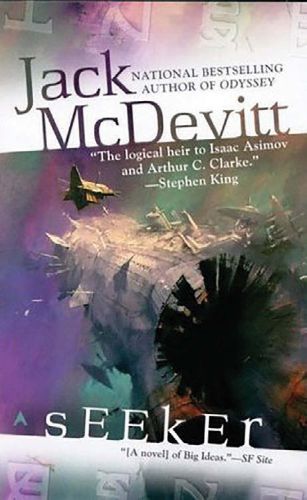OTHER WORLDS
A U.S. Navy man, a customs inspector, even a cabbie—that’s a bio we can buy. But an acclaimed sci-fi novelist who didn’t publish his first book until after he had turned 50? Now that definitely sounds like a work of science fiction.
Yet this is the life of 81-year-old Jack McDevitt, MALS ’72, best-selling author of 22 novels, including the acclaimed Alex Benedict series and the Priscilla Hutchins series, whose themes center around contact with alien races and xenoarchaeology. Throughout his work, he expresses a sense of wonder about the universe. A highly acclaimed contributor to the genre, McDevitt has been nominated more than any other author in history for the top yearly accolade in sci-fi and fantasy novel writing published in the United States—the Nebula Award for Best Novel.
At one point, however, McDevitt thought it was his writing career that would be history.
“I won a short story contest in college and it encouraged me, but around that time I read David Copperfield by Dickens, and I thought, ‘No way can I compete with this guy,’” he recalls. “I didn’t write another thing for around 25 years. I’m not sure I can fully explain it. I realized what good writing looked like and gave up.”
It surely wasn’t Dickens’s intention to have his talent sour another’s. But looking back, McDevitt says his long hiatus was just the ticket for his ultimate big break. “I needed time,” he says.
He also needed encouragement from his wife, Maureen.
“In 1979 I started complaining that I hadn’t become a science fiction writer. She told me I could do it and I should at least try.”
McDevitt’s life soon entered a new dimension, beginning with a short story—his first— published in the pages of The Twilight Zone Magazine, a sci-fi publication named after the classic television series. “I kept working in the Customs Service, but I also wrote regularly and found I could get published in many places,” says McDevitt, who makes his home in Brunswick, Georgia. “I was allowing this other part of me to come alive.”
That story, he says, wasn’t so far removed from his own existence, at least in one respect. “It’s about a guy who worked at a post office in Boston and he’s in love with the young woman who works at one of the other counters, but he’s scared to make a move. This was really about myself when it came to the writing business. In the story, the clerk gets a letter that had been mailed 140 years earlier from Ralph Waldo Emerson and was lost in the mail. The letter contains Emerson’s comment that if you can learn to believe in yourself, you can do almost anything. It worked.”
“I LOVE WHAT I DO. TO BE ABLE TO FEEL THAT WAY ABOUT SOMETHING CALLED WORK…ISN’T THAT A GIFT?”
Though McDevitt still believes the short story medium is king when it comes to putting out quality science fiction, becoming a novelist opened up his possibilities in the writing world. “I didn’t have any intention of writing a novel, but I was invited to,” he says. “I figured—why not?”
Among McDevitt’s most celebrated characters: Priscilla Hutchins. Today, a female lead in sci-fi might not stand out quite as much, but it wasn’t so long ago that this wasn’t the case, he says. “She’s a result of the Flash Gordon experience. When I was watching the serials, Dale Arden usually passed out when they got in trouble. Girls I knew when I was a kid were pretty tough, and my overall impression later has been that women are considerably tougher than guys. You know that old line that if guys got pregnant instead of women, the human race would have gone away long ago? Priscilla wants to know what’s out there. She gets involved with fighting forces that want to shut down interstellar flight. Women have e-mailed that they’ve been inspired because of Priscilla and that makes me feel great!”
Even though success has never eluded him, one thing did for years: the Nebula Award for Best Novel, presented by the Science Fiction and Fantasy Writers of America. McDevitt has been nominated for the prestigious prize 12 times. “I believe at one point I had been nominated seven or eight times without winning!” he laughs. “But when I finally did win, my feet didn’t touch the ground.” Seeker proved to be that winning novel. From a series about his character Alex Benedict, an interstellar antiquities dealer, this entry involved coming across a cup from a starship. Except, how could that be, when the starship had never returned from its one flight?
“Winning the Nebula Award, you throw a giant party and it becomes one of the great things in your life,” he says. “It meant so much.”
Even if he never types another word on his computer keyboard, McDevitt has already cemented his reputation as one of the most respected science fiction writers of all time. Why then, at 81, does he continue to write?
For McDevitt, the answer is simple: He feels he’s doing exactly what he was meant to do. “There are new worlds to explore and there are always questions to delve into,” he says. “The readers also make it worthwhile. Science fiction readers enjoy riding out to Jupiter, or having a way to examine the great what-ifs. If you told someone in 1970 about the Internet, would you have been taken seriously? Science fiction can be a fun way to look at what just might happen.”
He pauses, then voices what might have seemed strange to a younger self who allowed a 19th-century writer to almost permanently end his writing career before it ever began: “Why would I quit now?” he says. “I love what I do. To be able to feel that way about something called work…isn’t that a gift?”


